The enigmatic melodies of robins’ songs are not confined to daylight hours, as these birds often engage in nocturnal serenades, leaving many to ponder: why do robins sing at night?
This intriguing behavior challenges the conventional understanding of bird vocalization patterns and invites exploration into the multifaceted reasons behind their nighttime performances.
From territorial communication to mate attraction and adaptation to urbanization, the night songs of robins unveil a captivating aspect of their behavior.
Understanding the motivations behind this unique behavior adds a layer of complexity to our appreciation of these avian companions and their dynamic role in the nocturnal soundscape.
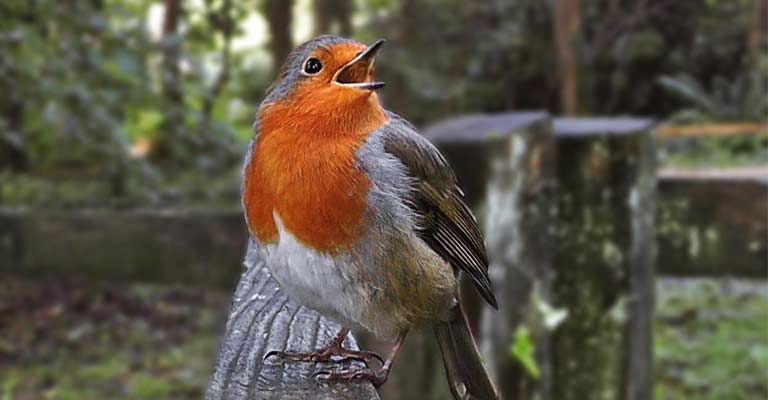
Why Do Robins Sing At Night?
Here’s why robins sing at night:
Territorial Communication
Robins are known for their territorial behavior, and singing at night can serve as a means of communicating territorial boundaries.
The nighttime song may act as a warning or declaration of an individual robin’s presence, helping to avoid conflicts with neighboring robins and asserting ownership over a specific territory.
Mate Attraction and Bonding
Nocturnal singing may also play a role in mate attraction. Robins may use nighttime vocalizations to communicate with potential mates, enhancing their chances of forming pair bonds.
These melodic expressions could serve as a way for robins to attract the attention of females and reinforce their connection during the breeding season.
Environmental Factors
Robins might sing at night in response to environmental factors such as artificial lighting or streetlights. These conditions can disrupt their natural diurnal rhythm, leading to nighttime vocalizations.
The increased ambient light may create an extended period of perceived daylight, prompting robins to engage in behaviors typically associated with daytime.
Temperature Regulation
In some cases, robins may sing at night as a response to temperature changes. Warmer nights might encourage increased activity, including singing, as robins become more energetically active during milder weather conditions.
Nighttime singing could serve as a way for robins to regulate their physiological processes.
Communication with Offspring
Parent robins might engage in nighttime singing as a form of communication with their offspring.
The unique vocalizations may serve to reassure and guide nestlings or fledglings, helping maintain a connection between parents and young birds during the critical stages of development.
Intraspecific Communication
Within a community of robins, nighttime singing could function as intraspecific communication, fostering cohesion among individuals.
The exchange of nocturnal vocalizations may convey information about group dynamics, social structure, or even the presence of potential threats, enhancing the collective awareness of the robin community.
Environmental Adaptation
Robins may adapt to specific environmental conditions, such as urbanization, by incorporating nighttime singing into their behavioral repertoire.
In areas with consistent human activity, the altered patterns of ambient light and noise could influence robins to adjust their singing schedules, ensuring effective communication despite artificial factors.
The reasons why robins sing at night are multifaceted, encompassing territorial communication, mate attraction, responses to environmental factors, temperature regulation, communication with offspring, intraspecific communication, and environmental adaptation.
The nocturnal melodies of robins reveal the complexity of their behaviors and their ability to navigate various ecological and anthropogenic influences.
Effects On Health Because Of Robins’ Singing
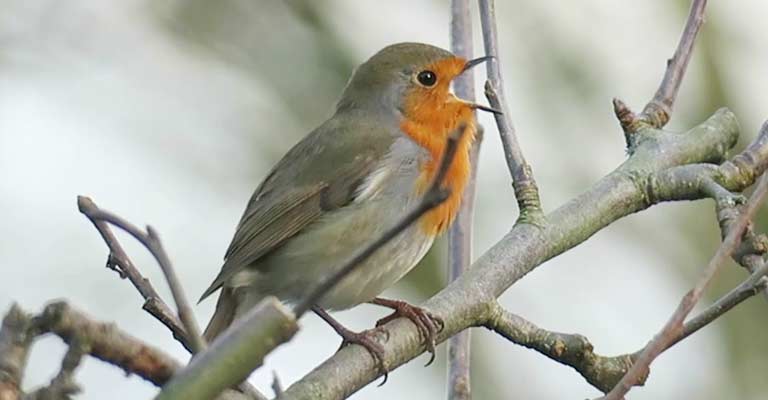
Here are some effects on health because of Robins’ singing:
Stress Reduction
The melodic tunes of robins’ singing can have a positive impact on human health by contributing to stress reduction. Birdsong, including that of robins, has been linked to lower stress levels and increased feelings of calmness.
The soothing and natural sounds can create a tranquil environment, fostering relaxation and mental well-being.
Improved Mood and Mental Health
Listening to robins’ singing may contribute to an improved mood and mental health. Engaging with nature sounds, including bird vocalizations, has been associated with enhanced feelings of happiness and reduced symptoms of depression and anxiety.
The rhythmic and harmonious nature of robin songs can elevate mood and create a sense of connection with the natural world.
Enhanced Cognitive Function
Exposure to the sounds of robins’ singing may positively influence cognitive function. Studies suggest that nature sounds, including birdsong, can improve cognitive performance and concentration.
The auditory stimulation provided by robin songs may contribute to a more focused and alert state of mind.
Promotion of Sleep Quality
The gentle and rhythmic melodies of robins’ singing can have a calming effect, potentially promoting better sleep quality. Nature sounds, including bird vocalizations, have been associated with improved sleep patterns and relaxation, contributing to overall sleep health.
Alleviation of Physiological Stress Responses
The pleasant sounds of robins’ singing may help alleviate physiological stress responses in the body. Exposure to natural sounds has been linked to reductions in heart rate and blood pressure, indicating a potential role in mitigating the impact of stress on the cardiovascular system.
Connection to Nature and Biodiversity
The presence of robins and their singing fosters a sense of connection to nature, contributing to overall well-being.
Engaging with biodiversity, even through auditory experiences like birdwatching, has been associated with increased feelings of connectedness and environmental awareness, promoting a holistic view of health.
Therapeutic Benefits for Healing
Robins’ singing can have therapeutic benefits for individuals undergoing healing processes. Nature sounds, including bird vocalizations, are increasingly incorporated into therapeutic practices known as ecotherapy.
These practices leverage the positive effects of natural sounds to support physical and emotional healing, enhancing the overall health and well-being of individuals.
The effects of robins’ singing on health are diverse and encompass stress reduction, improved mood, enhanced cognitive function, promotion of sleep quality, alleviation of physiological stress responses, connection to nature, and therapeutic benefits for healing.
The harmonious melodies of robins contribute not only to the richness of the natural environment but also to the well-being of those who experience their songs.
The Role Of Night Singing In The Robin’s Overall Behavior And Ecology
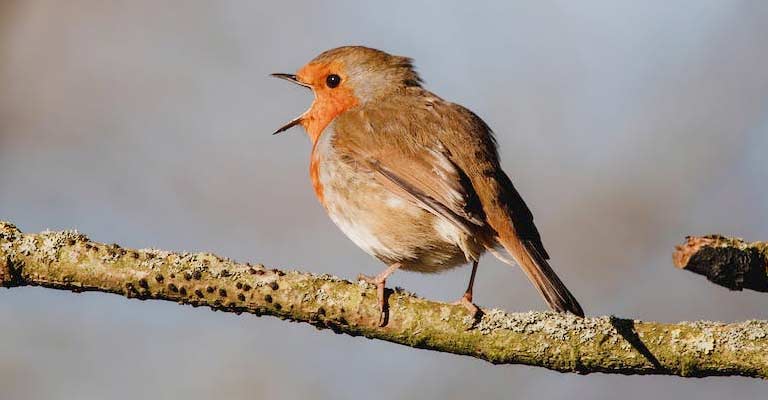
Here are some roles of night singing in the robin’s overall behavior and ecology:
Territorial Assertion
Night singing plays a crucial role in the robin’s overall behavior by serving as a means of territorial assertion. Robins are known for their territorial nature, and nighttime vocalizations help establish and maintain territorial boundaries.
The melodic songs communicate ownership of a specific area, acting as a deterrent to other robins and potential intruders.
Mate Attraction and Pair Bonding
Night singing in robins is linked to mate attraction and pair bonding. The intricate and often complex songs are employed as a form of communication with potential mates.
Robins engage in melodious vocalizations to attract females, showcasing their reproductive fitness. Night singing thus plays a pivotal role in the formation and strengthening of pair bonds during the breeding season.
Communication with Offspring
Night singing also has a role in the robin’s behavior as a means of communication with offspring. Parent robins may use nighttime vocalizations to interact with their nestlings or fledglings.
These unique calls convey information about parental presence, safety, and guidance, contributing to the well-being and development of the young birds.
Environmental Adaptation
The role of night singing in robin behavior includes adaptation to environmental conditions. In areas with high levels of artificial lighting or noise, robins may adjust their singing schedules to the nighttime.
This adaptation reflects the bird’s resilience and ability to navigate anthropogenic influences in their habitats.
Temperature Regulation
Night singing in robins may also be linked to temperature regulation. Warmer nights might encourage increased vocal activity as robins become more energetically active during milder weather conditions.
The nighttime songs may play a role in physiological processes related to temperature regulation.
Community Dynamics and Intraspecific Communication
Nighttime vocalizations contribute to community dynamics among robins. The exchange of songs at night fosters intraspecific communication, conveying information about social structure, group dynamics, and potential threats.
This communal interaction enhances the collective awareness of the Robin community.
Adaptation to Urbanization
Night singing showcases the robin’s ability to adapt to urbanization. In areas with consistent human activity, artificial lighting, and noise, robins may incorporate night singing into their behavioral repertoire.
This adaptation allows them to maintain effective communication despite the altered patterns of ambient light and sound in urban environments.
The role of night singing in the robin’s overall behavior and ecology encompasses territorial assertion, mate attraction, communication with offspring, environmental adaptation, temperature regulation, community dynamics, and adaptation to urbanization.
The melodic nighttime songs contribute significantly to the complex web of behaviors that define the robin’s ecological niche and reproductive strategies.
Other Birds That Sing At Night
Here are some other birds that sing at night
Northern Mockingbird (Mimus polyglottos):
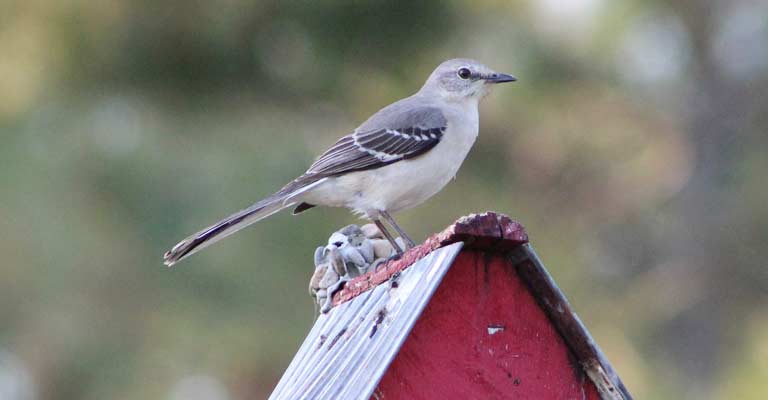
The Northern Mockingbird is renowned for its impressive vocal mimicry, and it often sings at night.
With a repertoire that includes imitations of other birds, insects, and even mechanical sounds, the Northern Mockingbird’s nocturnal serenades contribute to its communicative versatility and territory defense.
Common Nightingale (Luscinia megarhynchos)
The Common Nightingale is celebrated for its enchanting and powerful song, which is particularly prominent during the breeding season. Known for its nightingale song, this bird fills the night air with melodious notes, emphasizing its role in attracting mates and defending its territory.
Eastern Whip-poor-will (Antrostomus vociferus)
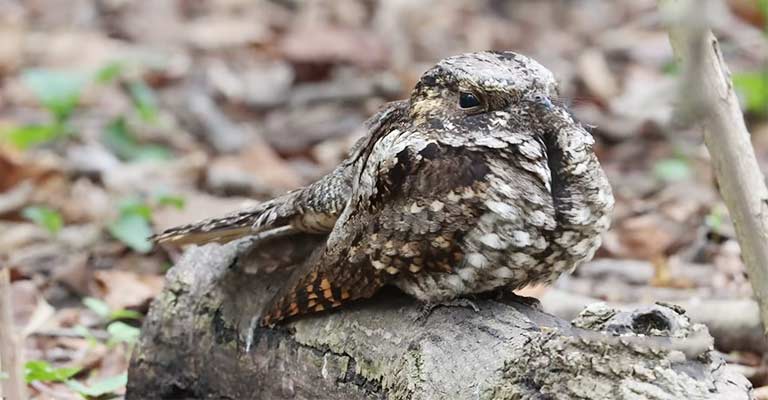
The Eastern Whip-poor-will is a nocturnal bird with a distinctive repetitive call that sounds like “whip-poor-will.” Active during the twilight hours and night, its song serves both for mate attraction and territory establishment.
The hauntingly rhythmic calls make it a characteristic sound of the evening landscape.
Common Poorwill (Phalaenoptilus nuttallii)
The Common Poorwill is North America’s only nightjar species that truly hibernates during the winter. It is known for its soft, repetitive call resembling its name (“poor-will”).
Active at night, the Common Poorwill’s calls contribute to its nocturnal communication and foraging behavior.
Eastern Screech-Owl (Megascops asio)
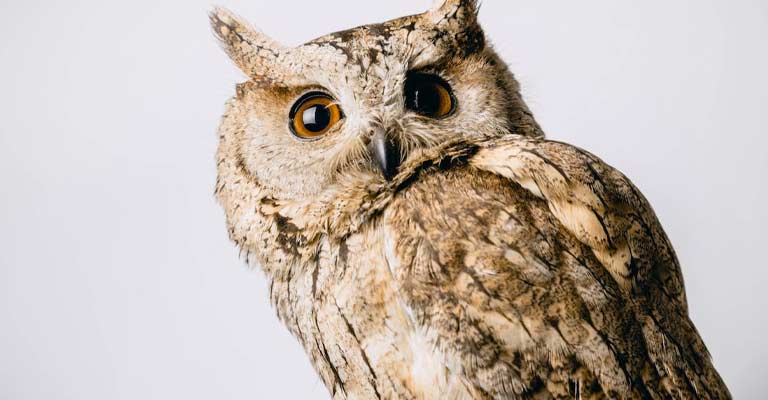
The Eastern Screech-Owl, a small owl species, is known for its distinctive trilling and whinnying calls. Active during the night, these calls serve various purposes, including territorial communication, mate attraction, and coordinating with their mate during the breeding season.
Chuck-will’s-widow (Antrostomus carolinensis)
This nightjar species is named for its distinctive call, often interpreted as “chuck-will’s-widow.” Active at night, the Chuck-will’s-widow engages in persistent and rhythmic vocalizations.
Its nighttime calls are attributed to mate attraction, establishing territories, and communicating with conspecifics.
European Nightjar (Caprimulgus europaeus)
The European Nightjar is a nocturnal bird known for its distinctive churring calls during the breeding season. Active at dusk and dawn, as well as during the night, the nightjar’s vocalizations contribute to mate attraction, territory defense, and communication within the species.
Various bird species engage in nocturnal singing for reasons such as mate attraction, territory defense, and communication.
The Northern Mockingbird, Common Nightingale, Eastern Whip-poor-will, Common Poorwill, Eastern Screech-Owl, Chuck-will’s-widow, and European Nightjar are notable examples, each adding a unique and enchanting dimension to the nighttime avian chorus.
FAQs
Why do robins sing at night?
Robins sing at night for various reasons, including territorial communication. Nighttime vocalizations help establish and maintain territories, warning other robins of their presence and preventing potential conflicts.
Do robins sing at night to attract mates?
Yes, robins engage in nocturnal singing to attract mates. The melodic songs serve as a form of communication with potential mates, enhancing their chances of forming pair bonds during the breeding season.
Is there a connection between robins’ night singing and urban environments?
Yes, robins may adapt to urbanization by singing at night. Artificial lighting and noise can alter their activity patterns, prompting nighttime vocalizations as a response to the changed environmental conditions.
How does temperature affect Robin’s night singing?
Warmer nights may encourage increased vocal activity in robins. The nighttime songs could be linked to physiological processes related to temperature regulation, reflecting their responsiveness to environmental cues.
Are robins’ night songs a form of communication with their offspring?
Yes, night singing in robins plays a role in communication with offspring. Parent robins may use nighttime vocalizations to reassure and guide their nestlings or fledglings, contributing to the well-being and development of the young birds.
Conclusion
In the mysterious symphony of the night, the nocturnal singing of robins unveils a spectrum of roles intertwined with their behavioral ecology.
From marking territories to wooing mates and adapting to changing environments, robins’ night songs reflect their adaptability and resilience.
As we listen to the soft melodies echoing through the darkness, the question of why robins sing at night becomes a poetic reminder of the intricate dance between nature and its creatures, offering a glimpse into the nuanced lives of these feathered companions under the moonlit sky.